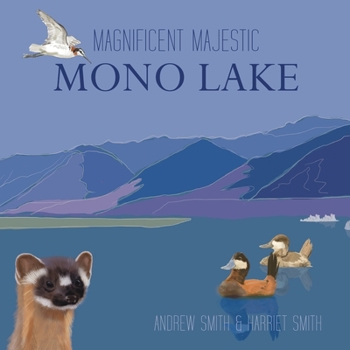Magnificent Majestic Mono Lake
Select Format
Select Condition 
Book Overview
Magnificent Majestic Mono Lake is an entertaining introduction to the eastern Sierra's Mono Lake and its basin, perfect for visitors and residents alike who want to quickly acquaint themselves with Mono Lake and its environs. Vibrant full-page color illustrations capture the beauty of Mono Lake, its surroundings, and the fascinating ecology and behavior of its wildlife. Each chapter is about two pages long, jargon-free, and scientifically up-to-date.
The introductory chapters explain the formation of ancient Lake Russell, now called Mono Lake, and how local geology-volcanoes, cold water springs, and the rushing snowmelt streams from the Sierra Nevada Mountains-all contributed to the Mono Lake we know today. Next up are chapters about Mono Lake's simple ecosystem, consisting of trillions of brine shrimp and alkali flies, followed by species accounts of the breeding and migrating birds that stop at Mono Lake in the millions to fatten up on this banquet of tasty microorganisms.
The high Great Basin Desert surrounding Mono Lake can be hot in summer and brutally cold in winter, and the ways in which animal and plant inhabitants have adapted to its variable climate, infrequent rainfall, and volcanic soils make for engaging natural history stories. The authors, Andrew and Harriet Smith, are superb storytellers and regale you with the fascinating life histories of many of the unusual species that thrive in Mono Lake or its basin. Here are some examples: eared grebes that gorge on brine shrimp until they are too fat to fly; slinky long-tailed weasels that make short work of prey over twice their size; fishing hawks (called ospreys) that nest on tufa towers in the middle of Mono Lake and commute to freshwater lakes to catch fish for their nestlings; and forests of golden-leafed aspen trees that are actually part of one giant organism rather than thousands of individual trees.
The book ends with the triumphant story of how the Mono Lake ecosystem was saved from extinction by an intrepid band of students and conservationists who recognized its ecological value. Mono Lake easily could have become one more toxic, windswept, sand playa, but instead, it teems with life. Vigilance is still necessary in light of lingering threats to Mono Lake, such as invasive species, and those that might emerge or worsen in the future, like climate change.
Related Subjects
Nature




